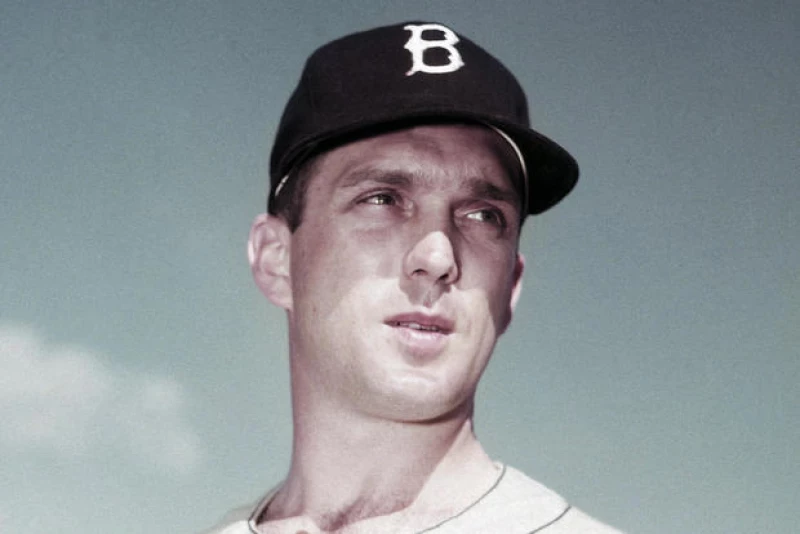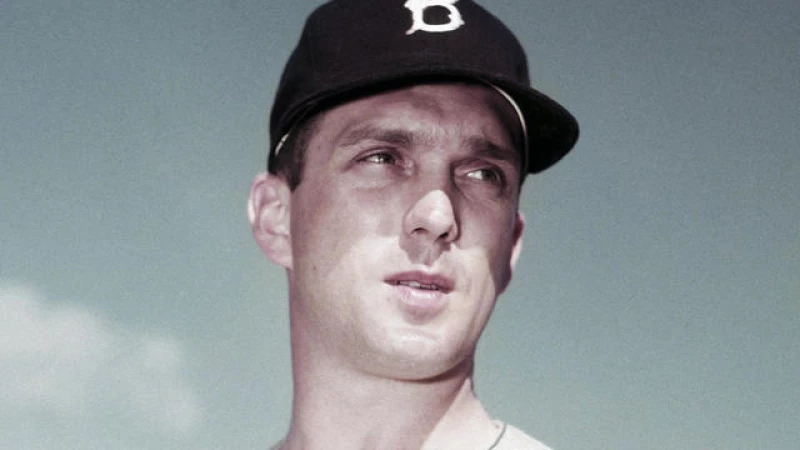Legendary Brooklyn Dodgers Pitcher Carl Erskine Passes Away at 97
Carl Erskine, a renowned pitcher for the Brooklyn Dodgers, known for pitching two no-hitters and achieving a 20-game winning season in 1953, passed away on Tuesday at the age of 97.
Erskine breathed his last at Community Hospital Anderson in his hometown of Anderson, Indiana, as confirmed by Michele Hockwalt, the hospital's marketing and communication manager.
One of the few remaining survivors from the iconic Brooklyn teams of the 1950s, Erskine dedicated his entire major league career to the Dodgers from 1948 to 1959, contributing to their success in clinching five National League pennants.
The right-handed pitcher boasted a career record of 122-78 with an ERA of 4.00 and 981 strikeouts.
In his standout year of 1953, Erskine achieved a remarkable 20-6 record, leading the National League. He notably secured a victory in Game 3 of the World Series against the Yankees with a 3-2 score at Ebbets Field. Erskine set a then-record of 14 strikeouts in that game, retiring the side in the ninth inning, a feat that remained unmatched until Dodgers' star Sandy Koufax recorded 15 strikeouts in 1963. Despite Erskine's stellar performance, the Dodgers ultimately lost the series in six games as the Yankees clinched their fifth consecutive championship.
Erskine was honored as an All-Star in 1954, following his impressive 18-win season.
Carl Daniel Erskine was a legendary baseball player who appeared in five World Series, with the Dodgers finally beating the Yankees in 1955 for their only championship in Brooklyn. He gave up a home run to Gil McDougald in the first inning of Game 4 and left after 3 2/3 innings. The Dodgers went on to win 8-5.
Erskine's death leaves the 88-year-old Koufax as the lone surviving Dodgers player from the 1955 World Series team.
Erskine received the Buck O'Neil lifetime achievement award in July 2023 from the Baseball Hall of Fame's board of directors to honor an individual whose efforts enhance baseball's positive impact on society.
"For millions of fans, he was a baseball hero," Hall of Fame chairman Jane Forbes Clark said in a statement. "For his family and thousands of Special Olympians, Carl was someone who always believed everything was possible. His legacy is one of deep compassion and encouragement of the human spirit."
Carl Daniel Erskine was born Dec. 13, 1926, in Anderson, Indiana. He began playing baseball at age 9 in a local parks program.
After graduating high school in 1945, he was drafted into the Navy with World War II underway. A year later, Erskine asked the Navy recreation officer where he was stationed if he could play baseball. He was turned away, but a few weeks later, he was scouted by the Dodgers and discharged from military service.
He spent the next 1 1/2 years in the minors before making his major league debut on July 25, 1948. Erskine began as a reliever, going 21-10 during his first two seasons.
In 1951, he made the transition to the starting rotation and became part of the esteemed "Boys of Summer" alongside Roy Campanella, Carl Furillo, Gil Hodges, Jackie Robinson, and Duke Snider.
The following year, in 1952, Erskine achieved a career-best 2.70 ERA and secured 14 wins. In the subsequent year, he led the NL with a .769 winning percentage, 187 strikeouts, and 16 complete games, all marking career highs.
During Game 3 of the 1951 NL pennant against the New York Giants, while teammate Don Newcombe was pitching in the ninth inning, Erskine and Ralph Branca were warming up in the bullpen on the suggestion of pitching coach Clyde Sukeforth.
Following Sukeforth's advice, Newcombe was replaced by Branca, who then allowed the game-winning home run to Bobby Thomson in the famous "Shot Heard 'Round the World."
Whenever asked about his best pitch, Erskine humorously recalled, "The curveball I bounced in the Polo Grounds bullpen in 1951."
Fans with Brooklyn accents affectionately nicknamed him "Oisk," and he went on to pitch no-hitters against the Chicago Cubs in 1952 and the New York Giants in 1956.
During the no-hitter against the Cubs, Bobby Morgan's exceptional fielding at third base saved the game with two outstanding plays on swinging bunts.
"I made two super plays on swinging bunts where they just dribbled down the line and I fielded them one-handed and threw to Gil Hodges at first," Morgan shared with The Oklahoman newspaper in April 2020.
Morgan, who passed away last year, mentioned that Erskine continued to express gratitude towards him in their conversations over the years.
The Dodgers left Brooklyn for Los Angeles in 1957. Erskine started the first home game in Los Angeles on April 18, 1958, when the Dodgers beat the San Francisco Giants 6-5 in front of more than 78,000 fans.
However, Erskine didn't enjoy being away from his family and he lasted just 1 1/2 years in Los Angeles. He pitched his final game in June 1959 and retired at 32.

Erskine returned to his hometown about 45 miles northeast of Indianapolis and opened an insurance business. He coached baseball at Anderson College for 12 years, and his 1965 team went 20-5 and won the NAIA World Series.
He also became active in the community and served as president and director at Star Financial Bank from 1982-93.
A six-foot bronze statue of Erskine was erected in front of the Carl D. Erskine Rehabilitation and Sports Medicine Center to honor his accomplishments in baseball and as an Anderson resident. An elementary school built on land he donated is named for him. He was inducted into the Indiana National Baseball Hall of Fame in 1979.
In 2002, Erskine Street in Brooklyn was named for him.
His youngest son, Jimmy, was born with Down syndrome, which led Erskine to champion the cause of people with developmental disabilities. He wrote a book called "The Parallel," about the similarities Jimmy and Erskine's teammate Robinson shared in breaking down social perceptions. He was long involved with Special Olympics in Indiana and the Carl and Betty Erskine Society raises money for the organization.
"Carl Erskine was an exemplary Dodger," Stan Kasten, Dodgers president and CEO, said in a statement. "He was as much a hero off the field as he was on the field, which given the brilliance of his pitching is saying quite a lot. His support of the Special Olympics and related causes, inspired by his son Jimmy, who led a life beyond all expectations when he was born with Down syndrome, cemented his legacy."
Jimmy passed away in November at the age of 63, surpassing his life expectancy by decades.
Erskine also penned the books "Tales from the Dodger Dugout" and "What I Learned From Jackie Robinson."
He is survived by his wife Betty of 76 years, and his children Danny, Gary, and Susan.







